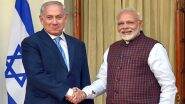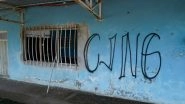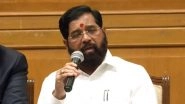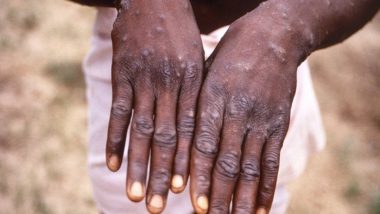New Delhi, May 31: Amid increasing cases of monkeypox being reported in non-endemic countries, the government on Tuesday issued guidelines directing district surveillance units to consider even one such case as an outbreak and initiating a detailed investigation through the Integrated Disease Surveillance Programme.
In the 'Guidelines on Management of Monkeypox Disease' issued to states and union territories, the health ministry stressed on surveillance and rapid identification of new cases as the key public health measures for outbreak containment, mandating the need to reduce the risk of human-to-human transmission.
Also Read | Rajya Sabha Elections 2022: Six in Fray for Four RS Seats in Rajasthan.
It stated that India needs to be prepared in view of the increasing reports of cases in non-endemic countries even as no case of monkeypox virus has been reported in the country till date.
The guidelines proposed a surveillance strategy to rapidly identify cases and clusters of infections and the sources of infections as soon as possible in order to isolate cases to prevent further transmission, provide optimal clinical care, identify and manage contacts and protect frontline health workers and effective control and preventive measures based on the identified routes of transmission.
Also Read | China's Economic Crisis Hits Countryside After Rural Banks Are Told To Freeze Withdrawals.
According to the guidelines, a confirmed case is laboratory confirmed for monkeypox virus by detection of unique sequences of viral DNA either by polymerase chain reaction (PCR) and/or sequencing.
All the clinical specimens should be transported to the apex laboratory of ICMR-NIV (Pune) routed through the Integrated Disease Surveillance Programme (IDSP) network of the respective district or state.
The guidelines explain the Infection Prevention and Control (IPC) measures, IPC at home, patient isolation and ambulance transfer strategies, additional precautions that needs to be taken care of and duration of isolation procedures.
Contacts should be monitored at least daily for the onset of signs or symptoms for a period of 21 days (as per case definition) from the last contact with a patient or their contaminated materials during the infectious period.
Raising awareness of risk factors under risk communication and preventive measures, the guidelines further explain in detail about raising awareness and educating people about the measures for monkeypox virus like avoiding contact with any material of the sick person, isolation of infected patient from others, practising good hand hygiene and using appropriate personal protective equipment (PPE) when caring for patients.
Monkeypox has been reported as endemic in several other central and western African countries such as Cameroon, Central African Republic, Cote d'Ivoire, Democratic Republic of the Congo, Gabon, Liberia, Nigeria, Republic of the Congo, and Sierra Leone. However, cases have been also reported in certain non-endemic countries like the US, the UK, Belgium, France, Germany, Italy, Netherlands, Portugal, Spain, Sweden, Australia, Canada, Austria, Israel and Switzerland.
The health ministry said it continues to maintain a close watch over the evolving situation.
(The above story is verified and authored by Press Trust of India (PTI) staff. PTI, India’s premier news agency, employs more than 400 journalists and 500 stringers to cover almost every district and small town in India.. The views appearing in the above post do not reflect the opinions of LatestLY)













 Quickly
Quickly


